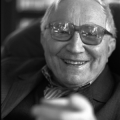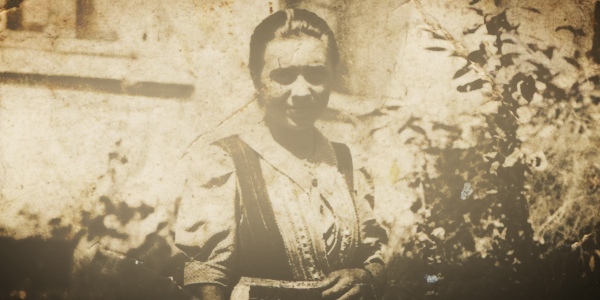You have no items in your cart. Want to get some nice things?
Go shoppingExcerpt from Mother Departs by Tadeusz Różewicz translated by Barbara Bogoczek
now
now, as I write these words, my mother’s eyes rest on me. The eyes, mindful and tender, are silently asking, “what’s troubling you, my darling…?” With a smile I reply, “nothing…everything’s fine Mummy, really,” “but tell me,’ Mother says, “what’s the matter?” I turn my head away, look through the window…
Mother’s eyes which can see everything watch the birth watch throughout life and watch after death from the “other world”. Even if they turned her son into a killing machine or a beast a murderer mother’s eyes are looking at him with love…looking.
[private]When a mother turns her eyes away, her child starts to stray, becomes lost
in a world stripped of love and warmth.
Tomorrow’s Mother’s Day. I don’t remember if when I was a child there was
an official day like that…When I was a child every day was Mother’s day. Every morning Mother’s day. And noon and evening and night.
You know Mummy, I can tell it only to you in my old age, and I can tell you now because I’m already older than you…I didn’t dare tell you when you were alive. I’m a Poet. It’s a word that frightened me, I never spoke it to Father…I didn’t know if it was decent to say something like that.
I entered the world of poetry as if into the light and now I’m preparing to exit, into darkness…I trekked across the landscape of poetry and have seen it with the eye of a fish a mole a bird a child a grown man and an old man; why is
it so difficult to utter these words: ‘I’m a poet’, you search for synonyms to help you come out to the world. To Mother. Of course, Mother knows. But to say something like that to my father was unthinkable…So I never did tell Father “Dad…Father…I’m a poet”. I don’t know if my father would even have noticed…he’d be so remote…he’d have said (while he read the paper, ate, dressed, polished his shoes…) “what’s that you’re saying (Tadziu)?” After all it was just silly “what’s that again?” but of course I couldn’t repeat it, let alone louder, “Dad, Father,
I am a poet”…Father might have looked up from his plate, his paper…looking surprised or perhaps not looking but nodding and saying “good…good” or saying nothing at all. I wrote a poem called “Father” (in 1954) “Walking through my heart goes/my old father…” I never knew if Father read that poem, he never said a word…anyway I never read it to Father either…now it’s 1999…and my voice is so quiet that my Parents can’t hear my words “Mum, Dad, I’m a poet”…”I know, Darling” Mother says “I’ve always known.” “Speak up” says Father “I can’t hear a thing”…
a poet’s promises
For years I used to promise my Mum three things: that I’d invite her to Kraków, that I’d show her Zakopane and the mountains, that I’d take her to the seaside. Mum never got to see Kraków. She got to see neither Kraków nor the mountains (with Lake Morskie Oko in the middle) nor the sea. I didn’t keep my promises…It’s been nearly half a century since Mum’s death…(anyway, clocks, calendars, I’m losing interest). Why didn’t I take her to Kraków and show her the Sukiennice, Saint Mary’s Church, Wawel Castle, the Vistula.
Oh yes. Her son lived in Kraków…and the young “promising” poet…a poet who wrote so many poems for his mother and so many poems for all mothers…didn’t bring Mum to Kraków not in 1947 nor 1949…She never insisted, never reproached me.
Mum never saw Warsaw. Mum never flew in an aeroplane, sailed on a ship. I never went with Mum to a café, restaurant, florist, theatre, opera…Or a concert…I was a poet…I wrote a poem “A Tale of Old Women”, I wrote a poem “An Old Peasant Woman Walks Along The Beach”…I didn’t take Mum to the seaside…I didn’t sit with her on the beach, I didn’t bring her a seashell or a bit of amber. Nothing…and she never will see the sea…and I’ll never see her face and eyes and smile as she looks at the sea…a poet. Is a poet a man who writes lamentations dry-eyed, so that he can see the form clearly? Who must put all his heart into making sure the form’s “perfect”…? A poet: a man without a heart? And now the wailing in front of an audience at a book fair, the poetic indulgences, the Literary Stock Exchange. I can’t even fool myself that “in the other world” Mum is strolling through the Planty Gardens, through Kraków, to Wawel…Is there a beach in “heaven” where our Mothers can sit in their poor old fur stoles, coats, slippers and hats…? But even now I’m writing—dry-eyed—and “correcting” these beggarly lamentations of mine…
in the midst of life
It is now 60 years since World War II broke out.
I’m 77, 78 years old. I am a poet. At the start of the road I couldn’t believe in the miracle…that one day I’d become a poet, sometimes at night woken by nightmares and spectres I clutched at the thought “I shall be a poet” I shall drive away spectres darkness death…I shall enter the light of poetry, the music of poetry, the Silence.
Now as I write these words, Mother’s quiet mindful eyes are on me. She watches me from the “other world” the other side I do not believe in. In this world another war is raging. One of the hundred that have raged continuously from the end of world war II until today…
My world that I tried to build for half a century is crumbling into fragments under the rubble of houses hospitals and temples man and god are dying, man and hope are dying, man and love.
Once, a long time ago in 1955, I wrote a poem “In the Midst of Life”…
After the end of the worldafter death
I found myself in the midst of life
creating myself
building life
people animals landscapes
this is a table I said
this is a table
on the table there is bread a knife
the knife is for cutting the bread
bread feeds people
man must be loved
I was learning night and day
what must be loved
man I answered
a poet! He grew old he stands on death’s doorstep and still he hasn’t understood that a knife is for hacking heads off hacking off noses and ears what is a knife for? for cutting heads off…some place over there, far? near? what else is a knife for? for cutting out tongues that speak in foreign tongues and for cutting open the bellies of pregnant women cutting off the breasts of nursing mothers cutting off genitals gouging out eyes…and what else can we look at on television? read in the papers? hear on the radio?
what is a knife for
it’s for cutting off the heads of enemies
it’s for cutting off the heads of
women children old people
(That’s what they’ve been writing in the papers
for a century…)
now as I write these words mother’s quiet eyes are on me on my hand on these maimed blinded words. our mothers’ eyes that penetrate hearts and thoughts are our conscience they judge us and love
full of love and anxiety
mother’s eyes
Mother watches her son as he takes his first steps and then as he seeks his way, her eyes watch as the son leaves, they take in the whole life and death of her son
possibly my words will reach mothers who abandoned their children on a rubbish dump or reach children who have forgotten their parents in the hospitals and the old people’s homes
I remember Mother saying
to us, only once probably…I was five…only once in her life she said to us “I shall leave you…you’re so naughty…I shall
go and won’t ever
come back”…three small naughty boys…I have remembered
all through
my life the fear and dark despair that we three felt…
I remember my heart bleeding (oh yes “my heart was bleeding”) I found myself in emptiness and darkness…Mum only said
it once
and today I still remember my tears and despair…
but mum didn’t go away she was with us and she will be…
now as I write these words…mother’s searching eyes are on me
I lift my head, open my eyes…can’t find my way, fall, get up, words filled with hatred ptomaine explode rip love faith and hope apart…I open my mouth to say something “people must be loved” not Poles Germans Serbs Albanians Italians Jews Greeks…people must be loved…white black red yellow I know my beggarly wailings lack good taste…
and I know that of all worldly things what survives is…
what?!
The great ludicrous genius Norwid said:
Of all worldly things only two survive,
Two only: poetry and goodness…and nothing else…
Oh Don Quixote, it’s the Nothing that’s survived! And if we do not begin to use our heads at last, do not get some grip on this vast expanding Nothing, then…then what? speak up, don’t look so petrified! what’s about to happen…we shall make such a hell on earth for ourselves that Lucifer will look like an angel, oh a fallen angel yes but not absolutely without a soul, prone to hubris yet at least dense with longing for a lost heaven dense with melancholy with sorrow…and politics will turn into kitsch, love into pornography, music into pandemonium, sport into prostitution, religion into science, science into faith.[/private]

About Tadeusz Różewicz
Tadeusz Różewicz (b. 1921) is Poland’s foremost living writer. Remarkable for his simultaneous mastery of poetry, prose and drama, he has been nominated for the Nobel Prize for Literature. Tadeusz Różewicz has been translated into over forty languages. The most recent English-language volumes, recycling (2001), New Poems (2007) and Sobbing Superpower (2011), were finalists for the 2003 Popescu Prize (UK), the 2008 National Book Critics Award (USA) and the 2012 Griffin Prize (Canada) respectively. In 2007 he was awarded the European Prize for Literature. Mother Departs (Matka odchodzi, 1999), exploring the life of his mother Stefania, is perhaps his most personal work. It won the Nike Prize in 2000, Poland’s most prestigious literary award. He lives in the city of Wrocław, Poland.





